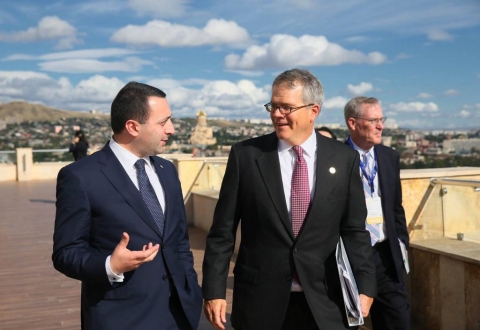Oct222015
Posted at 9:33 AM
Last week, Commerce Deputy Secretary Bruce Andrews led a United States delegation to Tbilisi, Georgia, to reinforce the U.S. commitment to expanding the overall cooperation and economic partnership with Georgia. The delegation included the State Department’s Deputy Assistant Secretary in the Bureau of Energy Resources Bob Ichord and USAID Deputy Assistant Administrator Jonathan Katz.
On his first day in Georgia, Deputy Secretary Andrews delivered welcoming remarks at the first-ever Tbilisi Silk Road Forum where he encouraged countries in the region to work together to develop a competitive trade and logistics corridor. Hosted by Prime Minister of Georgia Irakli Garibashvili, the Forum brought together 32 countries and almost 1,000 participants to exchange best practices, maximize opportunities and address challenges of how to strengthen regional cooperation.
During his remarks, Deputy Secretary Andrews highlighted that the re-emergence of the historic Silk Road trade, transit, and energy corridor that connects Asian and European markets holds great economic development potential. He also emphasized how stronger regional cooperation is key to developing a viable and competitive transportation and logistics corridor that can strengthen local and regional economies.
After the Forum, the delegation held various bilateral meetings with Georgian Prime Minister Irakli Garibashvili, President Giorgi Margvelashvili, Minister of Foreign Affairs Giorgi Kvirkashvili, Minister of Economy Dimitri Kumsishvili, and Minister of Energy Kakha Kaladze. In these discussions, they talked about ways to increase bilateral trade and investment, as well as potential cooperation to support Georgia’s economic development goals and its Euro-Atlantic integration.
Deputy Secretary Andrews encouraged the Georgian Government to focus on a forward-looking economic growth agenda that strengthens the business and investment environment and supports entrepreneurship, competitiveness, and innovation. He also highlighted U.S. support for increased security, greater economic development and connectivity, and a more advanced rules-based business and investment climate across the region.
In addition to meeting with government officials, Deputy Secretary Andrews met with Georgian Railway CEO Mamuka Bakhtadze to express support for continued development of Georgia’s railway network in the context of overall development of an East-West logistics corridor for transportation, trade, and investment in the Caucasus region.
Reducing costs, improving efficiencies, and guaranteeing predictability along the Silk Road requires additional investment in the region’s infrastructure, which is why Deputy Secretary Andrews met with Gabriel Schulze, CEO of Schulze Global Investments. The American private equity firm recently announced a $100 million investment fund in Georgia to mainly focus on hydropower projects.
Andrews also spoke with the Asian Development Bank and European Bank for Reconstruction and Development (EBRD) to see how these organizations can spur additional regional collaboration as an economic growth strategy.
To gain additional insight into the current political and economic situation in the region and what it will take to make the Silk Road a reality, Deputy Secretary Andrews met with representatives from the Atlantic Council, the Georgian Foundation for Strategic and International Studies, and Tbilisi State University’s International School of Economics.
Deputy Secretary Andrews concluded his trip to Georgia with a visit to Sakpatenti, a governmental agency that sets Georgian policy on intellectual property rights. In fact, Sakpatenti has collaborated for the past four years with the Commerce Department’s U.S. Patent and Trade Mark Office (USPTO) and the Commercial Law Development Program (CLDP) to streamline their processes and improve IPR enforcement as a foundation for innovation.
The United States deeply supports efforts to transform the region into a vibrant commercial trade network, and the Department of Commerce will continue to serve as a committed partner to the countries along the Silk Road.

